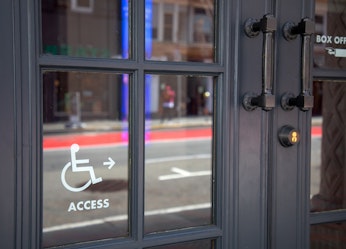

M|O Perspectives
Check back here for our thoughts on the latest developments in our industry.
Reports by a CASp... or a CASp Report?
Dec 22, 2020
At a recent Certified Access Specialist Institute (CASI) presentation, three presenters—Janis Kent, Terry McClean and Rachelle Golden—discussed how they are seeing detailed accessibility work being performed. Janis Kent is an architect and CASp, and Founding President of CASI. Terry McClean, an architect and CASp, served as a Legislative Chair for CASI. Rachelle Golden is a lawyer specializing in labor and accessibility, and she serves on the CASI board. The three individual perspectives and the ensuing discussion highlighted some interesting divergences between the way the CASp (Certified Access Specialist) regulations may have been intended to work versus how many CASps are conducting their reporting on a practical day-to-day level.
Some CASp professionals are choosing to use their accessibility expertise to inspect and advise, and are moving to provide reports "by a CASp" rather than a "CASp report_",_
the latter of which is required to be prepared according to CRASCA, the Construction Related Accessibility Standards Compliance Act. By California law, this kind of report provides certain legal protections and advantages when a property owner is subsequently sued over accessibility non-compliance.
A number of possible reasons for CASps to avoid the official CRASCA report were discussed in the presentation:
The reporting requirements for CASp reports that provide "qualified defendant" status can be significant and onerous both for the CASp and for the owner.
The significant majority of accessibility cases are settled in California, so the value of a CASp report and the protections it provides are seldom tested.
Since the CASp report is a state law, it does not provide protection in federal court, where perhaps 90% of accessibility cases are brought.
The CASp report provides protections only from the date of inspection, so it is of less utility if a business owner has already been the subject of a suit.
When in the middle of a lawsuit, a business owner may not want to commit to a 120-day timeframe, as some issues may take longer to address.
Other instruments of service, like letters of opinion from a CASp, plan reviews, and other forms of accessibility work are not under the requirements of CRASCA and don't provide qualified defendant status. Therefore, the information provided in these kinds of reports tend to vary between providers and can be targeted to the property type and the interests of the client.
Most requests for CASp work appear to come as a reaction to a complaint, but many developers are trending toward a proactive stance on accessibility issues, choosing wisely to involve an accessibility professional in the design and construction phases, rather than having to tear out and replace non-compliant work.
When engaging with a potential client, it is first always helpful to understand whether a lawsuit has been filed, and whether the client would like the CASp professional to be hired by their attorney, or directly by the client, which has implications for privilege and attorney work product.
Report formats and level of detail vary between CASp professionals and should be spelled out in the contractual agreement, so as to set appropriate client expectations. For example, CASp reports are not necessarily required to provide ADA and or CBC code references for each item of non-compliance. These can be time-consuming to generate and can be opaque and potentially confusing to clients who are unfamiliar with them and the specific language involved. They can, however, be helpful to architects and contractors when considering how to address issues going forward.
One increasingly common development involves city plan checkers and inspectors, who have begun to request or require an owner to provide a letter of opinion from a CASp, indicating that the plans have been reviewed, or that a project is in full compliance with accessibility requirements. It is important to understand that while individual jurisdictions and personnel can request such a service, this should not be a requirement. It is the city's job to inspect; an individual CASp reviewer should be supplemental. The CASp inspection process is a proactive process and is voluntary, not mandatory.
The CA Civil Code provides two options for CASp reports: either “Inspected by a CASp” (issues found), or “Meets applicable standards” (no issues found). There is no requirement that a CASp provide a report that indicates a property is fully compliant. In fact, there is no avenue under the CASp regulations that allows a professional to guarantee that a project is fully compliant. Regardless, the report provides a certificate of inspection, not a certificate of compliance. Additionally, since 2010, each municipality in CA has been required to have CASp professional(s) on staff, or to hire outside CASp inspectors to provide service to those who request it. If a building owner provides a CASp report to a city agency, it likely becomes part of the public record, which many building owners would not want for reasons of legal exposure or privacy.
Our expertise as CASps brings much insight, and each of us should use this information to consider how we best serve our clients and the needs of the community. For any questions or assistance from CASps, please contact Mark Hulme at mark_hulme@marxokubo.com

What we do.
- Owner's Representation
- Property Condition Assessment
- Project Management
- Constructability Reviews
- Repair | Reconstruction
- Facility Condition Assessment
- Construction Loan Monitoring
- Accessibility
- Building Enclosure
- Fire | Life Safety
- Mechanical | Electrical | Plumbing
- Sustainability & Resilience
- Structural Engineering
- ASAP® - Automated Structure Alert Program
Marx|Okubo is a national architecture/engineering/construction consulting firm that works with real estate owners, investors and lenders—at every point of the property lifecycle—to evaluate their building projects, solve complex challenges and implement tailored solutions. We help clients understand their projects’ complexities, so they can make more informed decisions and, ultimately, mitigate their risk.




